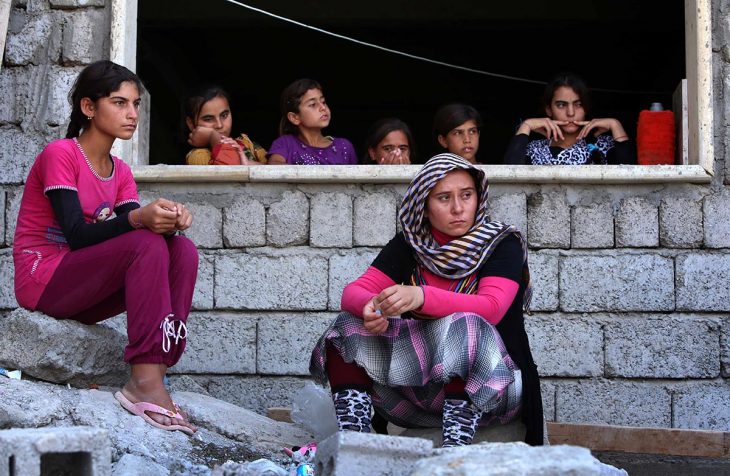Seven years ago, the militant group Islamic State of Irak and Syria (ISIS) invaded Sinjar in Northern Iraq, home to the Yazidi minority, killing and displacing hundreds of thousands of Yazidis. Men were forced to convert or executed. Women and children were sold into slavery, where they were raped and abused. One of them was 5-year-old Reda, who was “purchased” by an ISIS household and later died after her captor tied her to a window in the scorching summer heat to punish her for wetting the bed.
Now, the death of little Reda has led to the first conviction of an ISIS member for the genocide against the Yazidi community. The crimes against the Yazidi population in Iraq had been qualified as genocide by the United Nations before, but the court in Frankfurt is the first to translate that assessment into a judicial ruling in a national criminal court.
On the 30th of November, the higher regional court of Frankfurt found Iraqi national Taha al-J. guilty of genocide, crimes against humanity resulting in death, war crimes, aiding and abetting war crimes and bodily harm resulting in death. After 58 days of the trial, that had started in April 2020, the 29-year-old was sentenced to life imprisonment. In addition, the defendant must pay 50.000 Euros to the victim’s mother as compensation for the non-material damage she has suffered. Nora T. had survived the ordeal and joined the proceedings as a plaintiff. She testified against both Taha al-J. and his wife Jennifer W., who was sentenced to ten years imprisonment in a separate trial in October.
Proving the intent to destroy the Yazidi
According to the ruling, Taha al-J. and his wife had held the Yazidi girl and her mother as slaves in their house in the Iraqi city of Fallujah, where they forced them to convert to Islam. The captives were regularly abused and punished, which caused the little girl’s death between July and September 2015. Taha al-J. had tied her to a window exposing her to the midday sun for hours, which led to her death. According to the girl’s mother, the defendant took her lifeless body to a hospital and returned without it.
To prove genocide, based on just a single case, the court had to investigate two different levels of the crime: on the one hand, they had to show how the defendant treated the girl and how that eventually led to her death. But on the other hand, they had to prove that he followed ISIS ideology, believing that the Yazidi minority had to be destroyed. According to the court’s press release, it was central for the judges’ decision that “the defendant acted to the detriment of the joint plaintiff and her daughter with the intent to eliminate the Yazidi religious minority. This intention is a prerequisite for the criminal offence of genocide.”
The court found proof for Taha al-J.’s beliefs mainly through chats and pamphlets on his phone, as well as in a conversation his wife had had with an undercover FBI agent, explained lawyer Natalie von Wistinghausen, who represented the victim’s mother in court. In a phone call with Justice Info, she said that the individual criminal responsibility of the accused could only be proven thanks to the courageous testimony of her client: “The way he acted towards her and her daughter – that is where the intent to eliminate materialized.”
The Yazidi genocide becoming a historical fact
Nora T. had testified in both trials against Taha al-J. and Jennifer W. She struggled through days of questioning, describing exactly how her child was tied up and what the lifeless body looked like. The 48-year-old woman’s testimony had been emotional and sometimes contradictory, her dialect of Kurmanji hard to understand due to a speech impairment, and she had had problems specifying some information due to her low level of education. But when it came to the most relevant aspects, her testimony had been consistent, said her lawyer.
Wistinghausen, who worked on the case together with prominent human rights lawyer Amal Clooney, emphasized how important the verdict was for her client who was present during the reading of the verdict and reacted by saying she was happy – for herself and for the Yazidi community as a whole. “Of course she immediately continued to say that nothing would ever bring back her child”, the lawyer said, adding that apart from her client’s personal relief, the judgement was of international relevance. “The Yazidi genocide has been recorded as a historical fact”, she said, and that this could be useful for similar proceedings in the future.
For members of the Yazidi minority all over the world, the verdict means a lot. “Today is a historic day for our community”, wrote the German-Yazidi journalist and activist Düzen Tekkal on Twitter, a sentiment echoed by many other Yazidi individuals and organisations from different countries. “We, the Yazidi community have been crying out for justice for the past seven years. Today’s ruling is a significant victory in our ongoing battle for justice. The horrific crimes committed by ISIS members have been recognized and met with appropriate punishment.” In another Tweet she added that most Yazidi genocide survivors did not wish for revenge against ISIS members, but for trials such as this one, in accordance with the rule of law.
“Our client is a no-name”
Defense lawyer Serkan Alkan, however, considers the verdict a political decision. “Our impression was that someone needed to hang for the crimes of the Islamic State“, he told Justice Info the day after the ruling. “Usually, those who gave orders or were in power are put on trial. Our client, however, is a no-name.” Alkan has requested revision of what he considers an unjust verdict. He sees Taha al-J. as an opportunist, who merely took advantage of a situation – not an ideologically motivated criminal. “He would have done the same to anyone”, said Alkan, claiming that his client had not committed the crime with the intention to eliminate the Yazidi minority. “When the girl was about to die, he immediately took her to the hospital. If his intent was to destroy, he could have just left her to die.” Because he did not, there had been doubts throughout the trial about whether the girl actually died, and the defense still considers this unproven. When the judgement was read out in Frankfurt, Taha al-J. collapsed in the courtroom. The reading was interrupted and an ambulance arrived before the judges were able to continue.
About a month earlier, in Munich, Taha al-J.’s German wife Jennifer W. was sentenced to ten years in prison for membership of a terrorist organisation abroad, aiding and abetting attempted murder, attempted war crimes and crimes against humanity. She had been accused of standing by idly while the girl was dying of thirst. In the Munich trial, it is the prosecution and the joint plaintiff who have appealed the decision. They do not agree with the court’s qualification of W.’s crimes as minor rather than severe.








